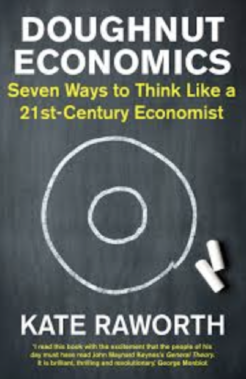Doughnut Economics: Seven Ways to Think Like a 21st-Century Economist by Kate Raworth
Bookreview
by Alexander Filippi & Jake Wilson
“You never change things by fighting the existing reality. To change something, build a new model that makes the existing model obsolete.” - Kate Raworth

Doughnut Economics: Seven Ways to Think Like a 21st-Century Economist by Kate Raworth
Doughnut Economics is a book that challenges the economic conventions we accept as dogma. It questions whether GDP (Gross Domestic Product) should be the cornerstone on which political and economical aims are built, and asks us to consider if everlasting continuous growth is possible. The central idea of this book arrives in the form of a doughnut. This simple shape conveys the compromise and balance needed between the requirements of our societies and the capacity of our environment. Using this and six other images, Raworth takes non-experts beyond the mindset of a neoliberal economist and introduces new ways of thinking forward. The strength of this book is in the illustrations. The author integrates and presents these ideas in a way that can be understood by everyone.
One particular sentence in this book resonates: “Economics (...) is not a matter of discovering laws: it is essentially a question of design”. We have a responsibility to design, calibrate and optimize an economic system which works for everyone, while avoiding the environmental problems that now scar our planet. As scientists, we learn not to accept things the way they are, but to question where they came from. We have the skills to design, to optimize and to calibrate. We have a responsibility to be a part of this change. The author captures this sentiment in the final chapter, ‘We are all economists now’, before outlining a vision of how we can all play a part in redesigning our economic model to a more circular and sustainable system.
Kate Raworth gives us hope through this book, hope that there are alternative solutions to the problems we are facing with our current economic model. For example, alongside GDP, to use metrics that encompass inequality, human welfare and sustainability. Her integrated approach helps to understand the challenges we are facing and to identify small tasks that everyone can incorporate into their life and work. If you are interested in thinking more broadly about sustainability, economics and the future of our societies, we highly recommend this book.












